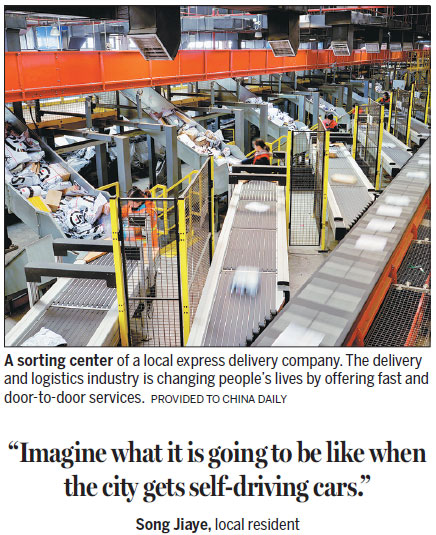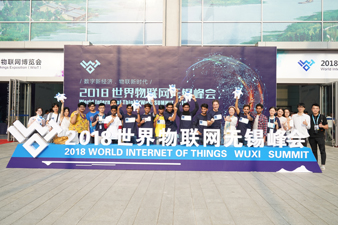Internet of things helps transform city into metropolis of the future
Internet of things technologies are transforming the everyday lives of people in Wuxi, Jiangsu province, thanks to the city's efforts to position itself at the center of the latest tech revolution.
New household appliances, medical devices and even clothes are being fitted with IoT sensors capable of sharing information for the benefit of users.
Elderly care homes in the city, for example, are already using IoT applications to help care for senior residents.
"We were the first elderly care home to use the smart digital cloud platform developed by Jiangsu CAS Nor-West Star Information Technology in 2013," said Xu Feng, manager of Wangzhuang Nursing Home. "Each of our residents wears a card around their neck with a small sensor which alerts us if they approach the exit or get stuck somewhere."

The platform serves around 25,000 elderly people in Wuxi and an additional 80,000 across China, said Wang Meng, CEO of Nor-West Star.
Since Wuxi was designated as the country's first IoT national demonstration zone in 2009, the local government has worked hard to create an attractive environment for tech firms, providing an impressive array of preferential policies to ensure the city attracts the technologies, human resources and capital required for the industry. And the efforts have paid off.
By the end of 2017, more than 180,000 people were employed by some 2,000 IoT companies - together earning revenues of 243.7 billion yuan ($35.6 billion). Some of the Wuxi-based firms have already developed industry-leading products, offering exciting new services for consumers.
For example, the Tian-Net system developed by Tian'an Smart Science & Technology enables drivers to photograph incidents for police investigations using voice-activated cameras.
And as a national first, Wuxi launched a citywide internet of vehicles LTE-V2X project in May; the project collects data from cars and drivers through a network of sensors installed on the city's roads, allowing drivers and traffic police to see areas of congestion and plan accordingly.
With an eye to the future of the industry, the local government recently released a new three-year (2018-2020) action plan on promoting a smart city campaign.
According to Gao Yaguang, vice-mayor of Wuxi, the plan emphasizes the application of IoT technologies to improve the quality of local public services in areas such as tourism, education and social care.
Meanwhile, the city plans to upgrade its internet speed as a pilot city for the new 5G mobile technology, further supporting its status as an IoT hub.
With the supportive environment for local tech firms and crucial infrastructure such as a fast internet network, the future appears bright for the development of the exciting new technologies in the city, according to local industry insiders and residents.
"Imagine what it is going to be like when the city gets self-driving cars," said 23-year-old local resident Song Jiaye.
Contact the writers at panqi@chinadaily.com.cn, zhuchen@chinadaily.com.cn

 Play
Play